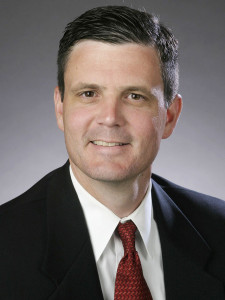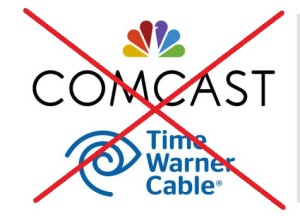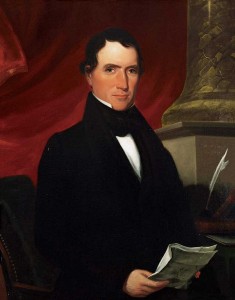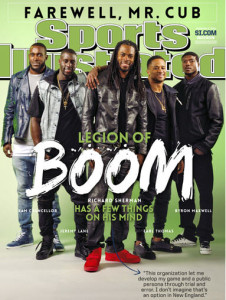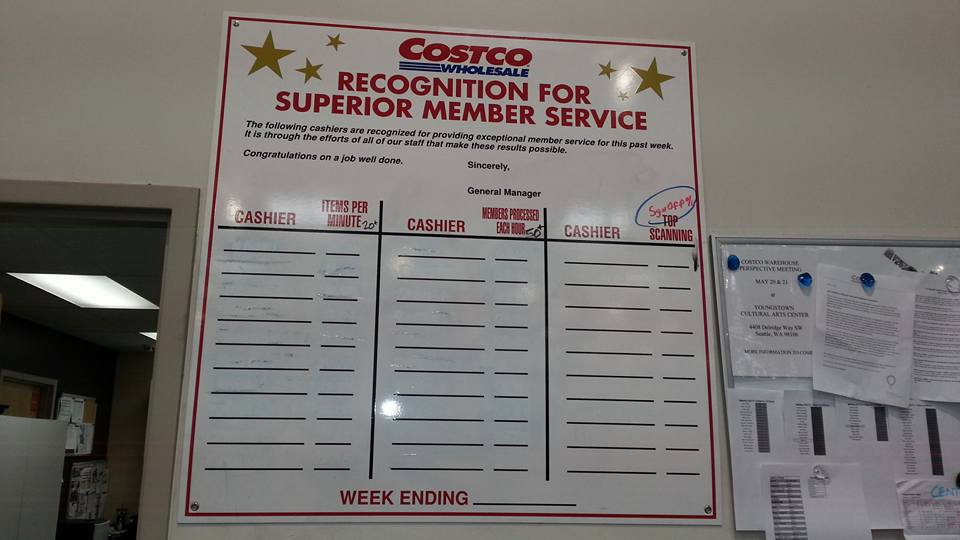 This was the scene for all customers to see near the check-out line today.
This was the scene for all customers to see near the check-out line today.
 Consider this a personal victory lap.
Consider this a personal victory lap.
More than three years ago in this space, I wrote about Cancer Fund of America, of Knoxville, Tenn., and its affiliate, Cancer Support Services, of Dearborn, Mich. I told of how only 40 cents of every $100 raised in cash–not 40%, 40 cents–benefited the afflicted, with the rest going for fundraising, management and overhead. I described a variety of questionable tactics to hide bad stuff and falsely make Cancer Fund and Cancer Support seem reputable and efficient as they trolled Seattle–and everywhere else in the country–begging for money.
I later nominated Cancer Support for my list of “American’s Stupidest Charities” for calling the New To Seattle world headquarters asking for donations even though I had described the organization in rather withering terms. Brilliant, Cancer Support was not.
Today, the Federal Trade Commission and the charity regulator of all 50 states announced in the Other Washington they had filed in Arizona federal court a civil lawsuit alleging fraud against Cancer Fund, Cancer Support, and two other nonprofits, Breast Cancer Society and Children’s Cancer Fund of America, plus several of their officials. All defendants are part of an empire created by James Reynolds Sr. of Knoxville, one of the named defendants. Continue reading
Share on Facebook Ah, the rites of spring. Longer days. Warmer temps. Blooming flowers.
Ah, the rites of spring. Longer days. Warmer temps. Blooming flowers.
And publication of the annual United States Postal Service list of “Top Dog Attack Rankings By City.”
Seattle–home to three dogs for every two children–fared a little worse this year over last. According to the USPS, the city was tied for No. 13 with Detroit. Last year, Seattle was No. 15 in a three-way tie (with Philadelphia and St. Louis). But both years, the number of reported dog attacks on letter carriers was the same: 28.
I say reported because, to put it bluntly, the USPS in previous years has had problems getting its numbers straight. It has counted as taking place in Seattle attacks that occurred outside the city and sometimes even on the other side of Puget Sound. For the fiscal year ending September 30, 2012, that artificially swelled the Seattle attack count by 17%. Seattle was ranked in a tie for No. 2 but should have been No. 5. Continue reading
Share on FacebookFor the third time I’m nominating Breast Cancer Research and Support Fund, a trade name of Community Charity Advancement, for my list of America’s Stupidest Charities. Why? The Pompano Beach, Fla.-based organization keeps calling the New To Seattle world headquarters asking for money even though I have written it up multiple times using words like “dubious,” “sketchy” and even “skanky.”
These are not exactly terms of endearment.
They are, however, my opinions about a nonprofit that allowed paid fundraisers to keep almost all the cash raised, spent maybe 1% of that cash on good works, falsely claimed affiliations with reputable medical facilities and has all kinds of red flags in its filings and on its website. Continue reading
Share on FacebookWith all the scandals and frauds seemingly popping up everywhere, maybe the American public–or at least the folks who edit the news for the American public–are just jaded. I can’t think of any other good explanation for the almost total lack of meaningful coverage outside the Pacific Northwest of the federal fraud, tax evasion and perjury indictment in Seattle last month of Troy X. Kelley, the state auditor of Washington State.
Searching through national news databases and the Internet, I found virtually no print coverage more than a couple paragraphs long outside of Washington State and its two adjoining states of Oregon and Idaho. One paragraph was the extent of coverage in The New York Times. Nothing came up in my searches of USA Today and The Wall Street Journal. The Associated Press transmitted nationally a lengthy story that seems to have found its way, generally in a shorter version, onto newspaper and TV station websites, but few hard copies or over-the-air broadcasts. Forbes.com, where I do some work, posted its own story.
State auditors are supposed to root out fraud and get to the truth of things, right? Be squeaky clean, right? So shouldn’t a federal indictment accusing a state auditor of outrageous flim flam and lying be a pretty good national story, if for no other reason than it rings the hypocrisy bell loud and clear? Continue reading
Share on Facebook![]() Regular visitors to this space know the New To Seattle world headquarters is no stranger to sketchy cancer charity telephone pitches. (See, among other posts, here, here and here.) But this was a first for me. Within just 20 minutes I received not one but two telephone calls from a fundraiser for the very same charity, which I had never heard of. It was an outfit called Breast Cancer Survivors Foundation, based in Aventura, Fla., a suburb of Miami.
Regular visitors to this space know the New To Seattle world headquarters is no stranger to sketchy cancer charity telephone pitches. (See, among other posts, here, here and here.) But this was a first for me. Within just 20 minutes I received not one but two telephone calls from a fundraiser for the very same charity, which I had never heard of. It was an outfit called Breast Cancer Survivors Foundation, based in Aventura, Fla., a suburb of Miami.
The experience was the same both times. The caller, who went by the name Lisa Kent, had trouble understanding my rather simple questions and was a little off in some of her answers, as though she had a hearing or cognitive issue. She soon hung up.
Not a good way for Kent to establish personal rapport. But that would have been hard in any event, because Kent was not a person but rather a voice-responsive computer. She/it probably was controlled by a human “supervisor” listening in and hitting buttons to provide answers.
I proceeded to look up the financial filings of BCSF, which says its main mission is to provide mammograms for women who can’t afford them. As I read the latest annual filings, paid telemarketers kept for themselves 92% of money raised from calls like the two I got. Only 5% of the cash was spent on mammograms. Continue reading
Share on FacebookThe collapse last week of the proposed Comcast-Time Warner Cable merger shows what can be done when millions of consumers complain–formally, with regulators and lawmakers, or informally, by bitching to their neighbors, who it turns out have the same issues–about overpriced products accompanied by faulty service. Comcast needed approval for this combination from federal regulators, who indirectly are accountable to members of Congress. But what elected official would be willing to stand up and defend Comcast given this track record?
Since becoming New To Seattle, I have railed on in this space about Comcast, which is the dominant provider of Internet and cable TV service where I live. Continue reading
Share on FacebookThe recent hit movie “Selma” recounts the historic civil rights marches 50 years ago orchestrated by Dr. Martin Luther King Jr. through that Alabama city. Meanwhile, on April 28 the U.S. Supreme Court will hear oral arguments on whether same-sex marriage is a constitutional right.
These events eerily intersect locally now that I am New To Seattle, which sits in King County. It officially is named now for Dr. King, and his face is the logo. But when created in 1852, the county was named for William Rufus DeVane King. Who he? King was the slave-holding vice president-elect of the United States who co-founded the city of Selma–and who probably was gay and in a de facto marriage with a future president of the United States.
Do I have your attention please? Continue reading
Share on Facebook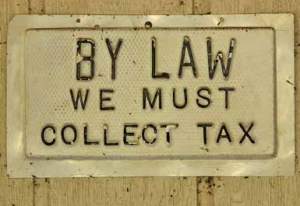 It was a story that got wide national play on April 1 when Seattle implemented the first phase of what in a couple of years will be the highest-in-the-nation minimum wage of $15 an hour. I even saw Mayor Ed Murray interviewed about the minimum wage live on CNN.
It was a story that got wide national play on April 1 when Seattle implemented the first phase of what in a couple of years will be the highest-in-the-nation minimum wage of $15 an hour. I even saw Mayor Ed Murray interviewed about the minimum wage live on CNN.
But another highest-in-the-nation Seattle increase that day got no big notice. The Seattle sales tax, already tops among the nation’s largest cities, went up from 9.5% to 9.6%. In many ways that says as much about the mindset of Seattle and Washington State. Continue reading
Share on Facebook One of the murkiest charities I’ve ever come across is Breast Cancer Research & Support Fund, a trade name of a Pompano Beach, Fla., outfit called Community Charity Advancement Inc. As near as I can tell, virtually none of the contributions received went to breast cancer research and support. The charity used legal accounting tricks to make itself look more efficient rather than the honey pot it really was for its paid fundraiser, who ended up with more than four-fifths of the cash given by unsuspecting donors. There are all kinds of inconsistencies on BCRSF/CCA’s regulatory filings and its Web site.
One of the murkiest charities I’ve ever come across is Breast Cancer Research & Support Fund, a trade name of a Pompano Beach, Fla., outfit called Community Charity Advancement Inc. As near as I can tell, virtually none of the contributions received went to breast cancer research and support. The charity used legal accounting tricks to make itself look more efficient rather than the honey pot it really was for its paid fundraiser, who ended up with more than four-fifths of the cash given by unsuspecting donors. There are all kinds of inconsistencies on BCRSF/CCA’s regulatory filings and its Web site.
I’ve twice nominated BCRSF/CCA for my list of America’s Stupidest Charities. Why? Its fundraisers kept calling the New To Seattle world headquarters asking for money after being written up here as a skanky operation. How much dumber can dumb be?
A recent query from a visitor to this space has focused my attention again on BCRSF/CCA. Right now on its Web site, BCRSF/CCA twice claims its good works benefited a well-regarded nonprofit health care provider in Seattle.
I don’t think so. Continue reading
Share on Facebook Living half of the 1980s in Houston, I experienced up close and personal that eternally repeating economic pattern long known as the boom-bubble-and-bust. I watched the same cycle living for seven years in the Los Angeles area just before becoming New To Seattle. As a New York City property owner for more than three decades. I’ve experienced a couple of BB&Bs.
Living half of the 1980s in Houston, I experienced up close and personal that eternally repeating economic pattern long known as the boom-bubble-and-bust. I watched the same cycle living for seven years in the Los Angeles area just before becoming New To Seattle. As a New York City property owner for more than three decades. I’ve experienced a couple of BB&Bs.
I’d say Seattle is well into that ominous pattern. To me, the only question is whether the city is still in the boom phase or already has moved into more risky bubble territory. If so, a bust with its many, many problems might not be too far off. Continue reading
Share on FacebookSince becoming New To Seattle in 2011, I have lived in Magnolia. It is situated on a hilly peninsula jutting out into scenic Puget Sound–and connected to the rest of Seattle by just three bridges over railroad tracks. Magnolia has the feel of a remote island even though it is less than three miles from the edge of downtown Seattle. For decades this relative isolation has suited many of its 20,000 residents, proud of and thankful for the neighborhood’s reputation as the safest part of Seattle.
But this has been rattled in recent months by an increase in burglaries–owing to a low base, the percentage jump is high although the actual number of offenses remains low for Seattle–car prowls and assorted other incidents, including one truly disturbing episode involving a man naked from the waist down. The response from somewhat panicked neighbors include creation of a private non-profit to organize security patrols paid by residents. An informational session at a local church drew a full house and attracted TV coverage.
Then there’s been the considerable chatter in this typically liberal Seattle neighborhood–which is nearly 90% white–about racial profiling. Continue reading
Share on FacebookThe annual Forbes list of the world’s billionaires out today lists the same nine Seattle-area folks that it did a year ago. Once again, Microsoft co-founder Bill Gates, is No. 1 in the world, with an estimated net worth of $79.2 billion, up $3.2 billion from a year ago. Amazon.com founder Jeff Bezos is No. 15 at $34.8 billion, up $2.8 billion. Ex-Microsoft CEO and Los Angeles Clippers owner Steve Ballmer checks in at No. 35 with $21.5 billion, up $2.2 billion in just 12 months. Continue reading
Share on Facebook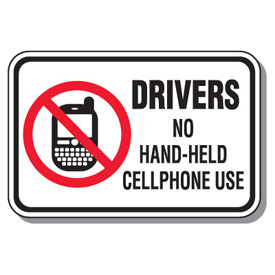 It happened again. Or, I should say, almost happened again. Or happened almost again.
It happened again. Or, I should say, almost happened again. Or happened almost again.
A car making a right turn nearly clipped the dog and me as we were about to cross a street during our daily constitutional around the Magnolia neighborhood of Seattle.
Fortunately, following the advice I have imparted here to others, even though we were in a marked crosswalk, I looked left before stepping out, then abruptly halted.
Besides the moving car running a stop sign, what I saw was a lone driver holding a cell phone to her ear, lips moving and not looking around much. It was the third time in a month that I nearly got whacked by a yakker in the ‘hood.
I counted at least four traffic violations: not stopping at a stop sign, not yielding the right of way to a pedestrian in a crosswalk, careless driving second degree and holding a cellphone to the ear while operating a vehicle. It’s the last offense I want to address. Continue reading
Share on Facebook Seattle is pushing plans to lower speed limits across the city, a bid to make the streets a little safer for pedestrians. The theory is that a pedestrian hit by a car has a better change of surviving if the car is going slower.
Seattle is pushing plans to lower speed limits across the city, a bid to make the streets a little safer for pedestrians. The theory is that a pedestrian hit by a car has a better change of surviving if the car is going slower.
Fair enough. But to my thinking, a significant contributing factor is the large number of pedestrians who cross streets without first looking left and right like their mamas told them to. Washington State law says persons on foot have the right of way at intersections whether there is a marked crosswalk or not. That’s fine. But a routine quick glance in both directions would bring the risk of getting hit (or killed) down to just about zero.
Share on FacebookA few weeks ago, I rode a crowded bus toward downtown Seattle during the morning rush hour, sitting in the middle of the very back row. The bus halted at a stop, and the front door opened. I couldn’t see anything, but heard plenty–a snarling dog, apparently brought on the bus by a patron. The dog, which I couldn’t see, was barking at something, perhaps a person but maybe even another dog. Eventually, the clamor subsided, and the bus resumed its trip.
Hardly anyone on the bus besides me looked up. That’s how common dogs are on Seattle mass transit.
A recent local TV news clip about one Seattle dog that sometimes rides by itself to a dog park went viral (click on image above). Now, even by Seattle standards, that’s unusual. But I still think the story got more notice elsewhere in the world than here, where dogs everywhere are far more of a way of life.
In dog-loving Seattle, there are three dogs for every two children (the national average is about one for one). Three years ago, I wrote about this ratio imbalance, suggesting that it might be proof of the Seattle Freeze, the then- but no longer-disputed notion that Seattleites are unfriendly to newcomers. I opined the Seattle Freeze might be the product of a fear of rejection, which dog owners don’t get from their dogs. Ergo, a lot of dogs. Continue reading
Share on FacebookBack in November, I wrote about how little of the money raised by Seattle Seahawks running back Marshawn Lynch’s personal charity made it to good works. This was after he alluded to the nonprofit, Fam 1st First Family Foundation, during one of his begrudging press availabilities.
As it turns out, he’s not the only Seahawks star with a personal nonprofit. All-Pro cornerback, injured player and new parent Richard Sherman has one, too. And unlike the Berkeley-educated Lynch, who doesn’t like to talk much to the media about anything substantive, the articulate Stanford-educated Sherman talks often about his desire to be a role model and better society.
But Sherman’s charity has one thing in common with Lynch’s. According to the latest filings, not much of the money has gone for its stated purpose. Continue reading
Share on FacebookRight now, I’m not sure Pete Carroll could even get elected King County dog-catcher. The vaunted 12 Man legion of Seattle Seahawks fans are still bitterly second-guessing the coach’s decision on how to get that last yard for victory at the end of SuperBowl XLIX on Sunday. You know, not by sending running back Marshawn (Beast Mode) Lynch crashing through the line again but by throwing a short pass that was intercepted.
Now, I’m not much of a football strategist. But if viewers of 115 million TV sets thought Lynch just should be given the ball, maybe, just maybe the tough New England Patriots defense thought that, too, and would prepare accordingly. So Carroll’s decision to call for a quick pass play pattern with a historically low chance of interception that would stop the clock if caught by no one maybe wasn’t such a stupid call. It was simply a calculated risk that didn’t work out.
My goal here, though, is not to defend Carroll, who is more than capable of defending himself. It’s to gently point out to my fellow Seattleites what I see as an inconsistency in their mindset. The people here bitching about Carroll’s risky decision live here only because of a century-and-a-half of audacious risk-taking by the folks who built up Seattle in the first place.
Hear me out on this. Continue reading
Share on Facebook I actually was beaten to the subject of this post by Melissa Perincheril, someone I have never met. In an opinion column buried (on page C-8) in today’s Seattle Times, she wrote that the successes of the Seattle Seahawks in the run-up to SuperBowl XLIX have helped pull Seattleites together to overcome a local phenomenon that I have written about here from time to time. In her words:
I actually was beaten to the subject of this post by Melissa Perincheril, someone I have never met. In an opinion column buried (on page C-8) in today’s Seattle Times, she wrote that the successes of the Seattle Seahawks in the run-up to SuperBowl XLIX have helped pull Seattleites together to overcome a local phenomenon that I have written about here from time to time. In her words:
Our city is infamous for what is called “The Seattle Freeze.” We smile politely at you if we are off our game and accidentally make eye contact with you, but we silently pray that you will not start a conversation with us. We are standoffish because our daily wardrobe includes headphones attached to our ears and cellphones glued to our hands–both clear indications of our desire for limited human interaction
According to the author’s bio, Perincheril is a 21-year-old University of Washington grad and presumably has been around here a while. Since the bio says says she works in the South Lake Union area, her employer probably is Amazon.
Perincheril suggests the Seattle Freeze permeates all human contacts. But I think the Seattle Freeze, which now has its own Wikipedia entry, mainly manifests itself in the way locals interact with the considerable number of newcomers–like me, New To Seattle. Still, Perincheril’s point strikes me as extremely well-taken. Continue reading
Share on Facebook The charities that cold-call the New To Seattle world headquarters asking for money generally are pretty easy to figure out once I end the call and look at their documents and filings. It turns out most of the funds collected go to outside paid fundraisers, with relatively little making it to what I consider to be a proper charitable purpose.
The charities that cold-call the New To Seattle world headquarters asking for money generally are pretty easy to figure out once I end the call and look at their documents and filings. It turns out most of the funds collected go to outside paid fundraisers, with relatively little making it to what I consider to be a proper charitable purpose.
The Multiple Sclerosis Foundation, a charity that I never had heard of but which called me out of the blue the other day, seems to operate a little differently. Yes, on the West Coast it does use outside paid fundraisers–like the pleasant person who called me–and they seem to rake off more than 70% of the take (charity watchdogs say that cut overall should be no higher than 35%). But unusual for the world of charity, MSF, based in Fort Lauderdale, also has a large corps of inside fundraisers–actual employees whose job it is to raise funds.
Now, there’s nothing illegal or even wrong about having staff members raise money. But this can make it a lot easier for a charity to call its fundraising expenses something else, like education or public awareness, and spruce up its financial efficiencies. And it makes it somewhat harder for someone like me to figure out with exactitude what’s really going on.
The situation also flummoxed the sober Better Business Bureau Wise Giving Alliance, one of the pillars of charitable evaluation. In a current report the BBB said it was “unable to verify” whether the MSF was accurately reporting its expenses, especially those related to fundraising.
This is quite a warning signal.
But after reviewing paperwork, I can see why. Continue reading
Share on Facebook
